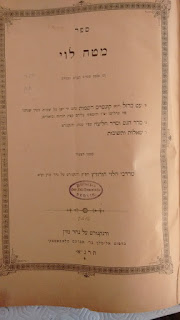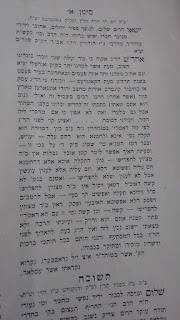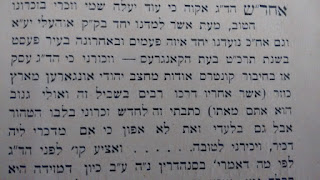Over the past week, I had the privilege of hosting a conversation with Rabbi Yosef Gavriel Bechhofer, Rabbi Yehudah Glick, and Professor Shaul Magid on my TOI blog, using the ReplyAll platform.
The conversation is now closed. I am reposting it below.
10/31/2015
10/22/2015
The Brilliance of Bibi's Big Lie: A Dramatization
Scene: Bibi’s office. In attendance are Prime Minister Netanyahu and everyone who would be played by a main character in an Israeli version of "The WestWing" (which would be called "The Aquarium"): media advisers, speechwriters, PR gurus, pollsters, etc.
Bibi: We’re three weeks into this new uprising and the world media narrative is all about how Palestinian violence is terrible but understandable given the Occupation™. We need to show that the occupation is the result of violence, not the other way around. How do we do it?
Speechwriter: We tell the truth. The truth is on our side. Their leaders lie about Jewish connection to holy sites. They lie about Ashkenazic Jews coming here as colonialist occupiers. They lie about and deny the Holocaust. About poisoning the wells. About defiling the Temple Mount with our filthy feet. They say Jesus was a Palestinian. Let them bury themselves with lies. We need to stay on message with the truth. Haters will hate.
Bibi: Who do you think you’re talking to? When I was Ambassador to the UN, I used to give these history lessons all the time. I was Mr. Context. Mr. Nuance. But it doesn’t work. Not anymore. Their lies are now presented as a side of the story, one that we have to refute.
Media Adviser: Correct. The news cycle is fast and fickle. Media outlets need click-bait. Truth, especially complicated truth, doesn’t attract eyeballs. Forget about history lessons.
Speechwriter: So we lose the media and keep the truth. Let’s stay on the high ground.
Pollster: What high ground? The media is a real battlefield today. World leaders are constrained by public opinion. If you can win public opinion, it gives your allies much more freedom and shackles your opponents. Look at Obama. There was only a certain amount of leeway he had to act against us, because American public opinion is on our side. In contrast, Sisi can’t say what he really thinks of us because public opinion is so poisoned against us.
Bibi: Agreed. But what are our options? There are a dozen groups who exist to call out the lies and inaccuracies of the media against Israel. CAMERA, HonestReporting, CIFWatch, etc. How many editions of Myths and Facts have been published? But they’re playing defense. Our enemies still control the discourse. We need to stop getting bogged down in arguments within their frame of reference. How can we play offense?
PR Guru: Talk about the Mufti.
Media Adviser: Who?
Bibi: Hajj Amin al-Husseini, the Grand Mufti of Jerusalem. He was behind the Arab uprisings in 1920-21, he was behind the massacres in 1929, and he was behind the Arab Revolt in the 1930s, which closed the door to immigration to Mandatory Palestine just before World War II. He was behind the Farhud in Baghdad in 1941. Then he fled to Germany, where he was a guest of Hitler for the rest of the war.
PR Guru: A very bad dude, and a Palestinian founding father. If we can draw attention to him, it totally undermines the narrative that violence is the result of the occupation. He was hobnobbing with Hitler before there was a State of Israel.
Pollster: Still, too much information for the average consumer of the news. Dates, numbers, all just bugs crawling across a screen.
Media Adviser: Any pictures?
PR Guru: Yeah. There’s one of him with Hitler. There’s one of him with other high-ranking Nazis. No shortage.
Bibi: That’s the angle. We need to get that picture out there. A leading Palestinian cozying up to Hitler before there was a State of Israel.
Media Adviser: Not so simple. What are we supposed to do, send a photo of the Mufti and Hitler to all the newspapers? He’s old news. He needs to be in today’s news.
Speechwriter: What if we drop his name in a speech in English? It’ll make the newspapers.
Media Adviser: Maybe the Israeli and Jewish media. Everyone else will just ignore it or bury it. There’s no meat. Nothing to really capture the world’s attention.
PR Guru: We need to overstate the case. We need to tell a lie that will provoke reaction, that will get everyone to “set the record straight” about the Mufti.
Pollster: But it needs to be sticky. We need people to remember in a month that the Mufti is a really bad dude, but there’s disagreement about just how bad. That’s got to be the residue that’s left over in people’s minds.
Media Adviser: Especially if that picture gets out. People will remember that he had something to do with Hitler, even if they don’t remember what.
PR Guru: Great. We’re in agreement. What’s the lie that we tell?
Bibi: We tell them that the Mufti convinced Hitler to kill the Jews.
Speechwriter: With all due respect, Mr. Prime Minister, that’s insane. You will be a laughingstock. Everyone will say you’re a liar or an idiot.
Pollster: They’ll spin it against you. They’ll say that you absolved Hitler from the crime of murdering six million Jews. That you trivialize or deny the Holocaust.
Media Adviser: The memes will be flying around the internet.
Bibi: What’s a meme?
Media Adviser: Something like this.
Bibi: That’s pretty funny.
Media Adviser: Hilarious. But you will be the butt of thousands of these jokes.
Bibi: As you said, though, the news cycle is quick. I can take a round of jokes at my expense. I can clarify that Hitler is to blame for the actual killing. But what are the strategic implications? What will we lose, what will we gain?
Pollster: You won’t lose much in the polls. Haters will hate, and I don’t think you’ll lose much support. They’ll say it was a stupid gaffe and move on.
Media Adviser: It will change the discourse on the violence. People will remember, if nothing else, that Palestinian violence and opposition to the Jewish state predates any occupation. It will put the Palestinian leadership on the defensive for the first time I can remember.
Bibi: And what about my credibility? This is a major strategic shift we’re talking about. It means no one will ever trust us again.
Speechwriter: And the Holocaust... I mean, falsifying Holocaust history is dangerous.
Bibi: I'm not talking about school curricula. I'm talking about what to say to the media. What you tell the media is not what you tell your kids. I'm not advocating a complete abandonment of the truth.
Speechwriter: I'm not comfortable with this.
Pollster: There’s a risk. No question. On the other hand, you’d be amazed at the degree to which supporters overlook the flaws of their favored candidates and magnify the flaws in the ones they don’t like. It’s crazy. You’d think they’d realize by now that the vast majority of politicians are borderline sociopathic. But no.
PR Guru: Look, everything you say is filtered through the media anyway, and they’re understandably not credible. People pick their news sources based on what they want to hear. If someone looks to the media, any media, for truth, they get what they deserve. And that’s the overwhelming majority of people. All we’re doing is getting the media to tell the lie that we want them to tell instead of the one that they would tell otherwise.
Media Adviser: Look, if we tell the truth, they respond with lies. If we lie, they'll respond with truth or lies. We can still respond to their lies with truth, but honestly, nobody knows the difference anymore, anyway. And there’s also the truthiness factor.
Bibi: The what?
Media Advisor: Truthiness. The quality of feeling true even if it isn’t. The word comes from Colbert, the American comedian, but it’s basically driving American politics right now. Take Trump. His overall message resonates with people, and they don’t care about details, accuracy, reasonability, etc.
Speechwriter: That blathering idiot?
Media Adviser: That blathering idiot is a juggernaut who might be the next POTUS. If you read the Dilbert Blog, you’d also know that he’s a genius.
Bibi: I don’t want to be compared to Trump.
PR Guru: You won’t be. He’s an extreme case. But there’s value in taking notes from a master. He absolutely dominates coverage of the 2016 elections.
Bibi: Okay. And what about our relationship with the PA? Long-term damage?
Speechwriter: Actually, it can advance your overall vision. You’ve said time and again that peace can only come with mutual recognition of each other's claim to the land, and that any two state solution has to acknowledge that Israel is the state that embodies the self-determination of the Jewish people, just as the Palestinian state will be the nation-state of the Palestinian people. A major obstacle to that is this notion that we’re foreign occupiers with no connection to the land. Attention to the Mufti will help marginalize that narrative, which, after all, was propagated by a Nazi.
Bibi: Interesting. I like it. When’s my next scheduled major English speech?
Media Adviser: World Zionist Congress on Tuesday, October 22.
Bibi: Draft the speech. Plant the bombshell in it. Then, gentlemen, we will sit back and watch as the whole world acquaints itself with the Grand Mufti of Jerusalem.
10/12/2015
A Note on the Khazar-origin Theory of Hungarian Jewry
An advantage of davening in a minyan in a local yeshiva is that you never know what seforim might turn up or what you might find in them.
This past Shabbat I found a copy of Mateh Levi (it's a bit different from the standard printed volume; much fewer responsa). This book, which is mainly about writing Gittin but also contains responsa on all sorts of issues, was written by R. Dr. Mordechai (Markus) Halevi Horovitz, a Hungarian rav who eventually became the rabbi of general (i.e., non-secessionist) Orthodox community in Frankfurt (or Vrankvurt, as it is spelled in this book). That is, he was a rival and critic of RSR Hirsch.
As you can see from the stamp, this particular volume, printed in 1891, belonged to the library of the Berlin Jewish community. There are actually stamps indicating that it was checked out of that library several times in the early 1920s. It eventually found its way to the yeshiva high school in Modiin, where I peruse it on Shabbat.
The first responsum begins with a question from R. Asher Grossberg of Eszlar.
R. Asher begins the query by reintroducing himself, reminding R. Horowitz that they studied together in Ujhely (a major Hungarian yeshiva) and met again at the famed Jewish Congress that took place in the winter of 1868-9. He also mentions that R. Horovitz was then working on a treatise to prove that Hungarian Jews are descendants of the Khazars.
That may be surprising, so a bit of background. When the Dual Monarchy was established in 1867, Hungarians became a minority within their own kingdom. To help alleviate that, they extended full civil rights to the Jews, on condition that the Jews would declare "Magyar" (=Hungarian) as their nationality. The Jews, by and large, saw the opportunity and went along with it. Some, like R. Akiva Yosef Schlesinger, were strongly opposed, maintaining that this is a betrayal of Jewish nationhood (he was a Haredi and a Zionist, by any definition of either). Eventually, it became popular to claim that Hungarian Jews were descendants of the Khazars who migrated westward along with the other Hungarian tribes in the Middle Ages - that is, that Hungarian Jews are indeed as Hungarian as any Hungarian.
It is surprising to me that such theories were being propounded by respected rabbanim so soon after the process of Magyarization began.
To dispel doubt: I do not believe that Hungarian Jews, or any other Jews, are the descendants of the Khazars, nor do I believe that there was ever a mass conversion of Khazars to Judaism.
Subscribe to:
Posts (Atom)




